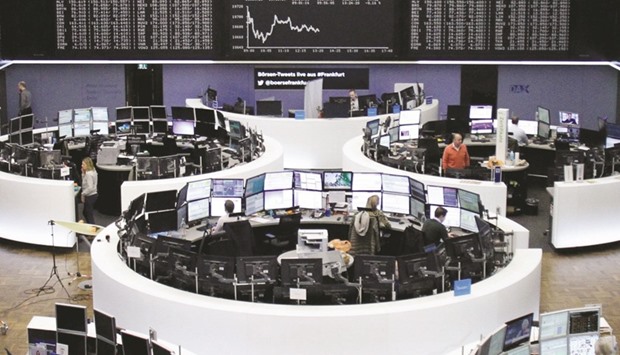European stock markets drifted higher yesterday, as Tokyo again pushed higher thanks to a weaker yen while Wall Street pushed higher after Thanksgiving.
London’s benchmark FTSE 100 index added 0.2% at 6,840.75 points, as unrevised official data showed Britain’s economy grew by 0.5% in the third quarter.
Frankfurt’s DAX 30 edged up 0.09% at 10,699.27 points and Paris added 0.2% at 4.550,27 points.
The EURO STOXX 50 ended 0.2% up at 3,017.33 points.
Wall Street pushed higher as US traders returned from Thanksgiving holiday, with shares of leading retailers rising as the holiday shopping season kicked off amid expectations of solid sales.
The Dow was showing a gain of 0.3% in late morning, with trading set end at 1pm.
With traders confident the Federal Reserve will hike interest rates before Christmas, the dollar has been cruising along, hitting record highs against India’s rupee and the Turkish lira and touching multi-month highs elsewhere.
The dollar lost a bit of steam on Friday with many US investors expected to take a long holiday weekend.
The dollar’s advance has come hand in hand with a rally across world markets since Donald Trump’s shock presidential election win, with dealers expecting his big spending, low tax plans will boost the world’s top economy.
However, there are some concerns inside emerging market governments about his campaign pledge to review global trade deals, which could lead to an era of protectionism and throw up huge US tariffs.
While trading has been slow yesterday, next week the pace is expected to pick up.
US third quarter GDP data and monthly employment data are to be released.
In Asian trading hours Friday, the dollar hit an eight-month high at ¥113.90 — providing more support for Japan’s exporters — before falling back in European trades.
Another weak reading on Japanese consumer prices meant any monetary tightening by Japan’s central bank was unlikely in the foreseeable future.
Oil prices tumbled after Saudi Arabia pulled out of some preliminary talks ahead of key Opec meeting next week on how to implement a deal aimed at boosting prices.
“There appears to be some scepticism setting in that we’ll see any meaningful deal come out of next week, with the positions of Iran and Russia likely to be particular sticking points,” said CMC Markets’s Hewson.
Disagreements about how to share the burden of supply cuts have spilt into the public in recent days, with Iran insisting it be allowed to increase output to pre-sanctions levels and non-OPEC Russia willing only to freeze, not reduce, production.

Traders work inside the stock exchange in Frankfurt. The DAX 30 edged up 0.09% at 10,699.27 points yesterday.
